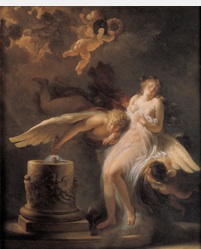Cultural Cocktail Hour
“Declarations of Love in Music and Image”- The J. Paul Getty Museum and LA Opera
On May 3rd The J. Paul Getty Museum in conjunction with LA Opera, hosted a conference on the “Declarations of Love in Music and Image.” Speakers included: Michael Walsh, music critic for TIME magazine, Mitchell Morris, UCLA Musicology Professor, and Scott Allan, assistant curator in the Department of Paintings at the J. Paul Getty Museum. The conference concluded with a dynamic and moving performance by LA Opera. Soprano Tammy Jenkins, Tenor Robert MacNeil, and pianist Daniel Faltus performed selections from Puccini’s Tosca, Suor Angelica, and La Rondine.
Scott Allan illuminated the Getty exhibit on Fragonard’s “Allegories of Love”, a departure from the artist’s earlier, frothier Rococo style. Love becomes elevated from frivolous entanglements to a new state of spiritual ecstasy. The exhibit compared Fragonard’s Sacrifice of the Rose with Bernini’s Ecstasy of St. Theresa.


Allen also noted that in the Allegories, Fragonard’s palette becomes darker, more muted, invoking nocturnal mystery. For instance, in The Oath of Love, these darker shades contrast with the lovers who are symbolized by a radiant central energy.

Fragonard’s Kiss illustrates the power of love to vanquish even death. The sarcophagus breaks open and one can see the lovers embrace through the vapors as Love travels to the great beyond.
Fragonard’s The Kiss, 1785, Brown Ink over black chalk; The Albertina, Vienna
Professor Morris’ lively lecture on Puccini revealed that at the time of La Rondine, musicologist Fausto Torrefranca accused Puccini’s music of inciting criminal decadence. Cesare Lombrosio, an Italian Criminologist, believed in the degeneration social theory, whereby humans could “evolve” into a class of criminals. Torrefranca’s critical attacks suggested that Puccini’s opera could do the trick. Modern audiences, those of the Mozart for Babies age, may find it absurd to think that at one point in history, exposing children to opera was considered a recipe for Juvenile Delinquency. Perhaps Torrefranca’s misguided attacks can be best summarized by a Bon Jovi song: Shot through the Heart and Opera’s to Blame, Darling, you give Music a bad name.

On Torrefranca’s Most Wanted List













